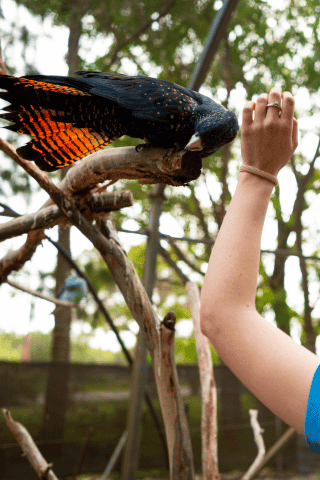Defining Exhibited Animals
Exhibited animals refer to those kept for public display, public education, or conservation purposes in regulated environments. Generally speaking, these include animals housed in:
- Zoos
- Wildlife conservation parks
- Aquariums
- Mobile animal exhibits
- Petting farms
The term ‘exhibited animals’ encompasses a wide range of species and settings, from small amphibians in specialised enclosures to large mammals in open-range habitats.
Careers with Exhibited Animals
The Significance of the Term "Exhibited Animals"
In Australia, the care and management of exhibited animals are governed by specific regulations. This term distinguishes this specialised field from pet care or livestock management, highlighting the unique requirements and responsibilities involved in caring for animals in public display settings.

Career Opportunities in Exhibited Animal Care
The field of exhibited animal care offers diverse career paths for those passionate about wildlife and conservation. Some potential roles include:
- Zookeeper
- Animal or Zoo Nutritionist
- Zoo experience officer
- Wildlife park ranger
- Animal education officer / Docent
- Aquarium specialist (Aquarist)
- Conservation educator
- Animal trainer for presentations
- Veterinarian
- Veterinary nurse specialising in exhibited animals
- Animal attendants
- Farmhand
- Animal enrichment and enclosure design specialists
- Aviary attendant / bird keeper
- Reptile keeper
- Wildlife keeper
- Aquarium keeper
Thinking about studying?
Start your journey to a rewarding career working with Exhibited Animals
Key Responsibilities in Exhibited Animal Care
Working with exhibited animals involves a range of tasks that require both specialised knowledge and practical skills:
- Preparing and administering diets
- Implementing enrichment activities
- Maintaining animal habitats and ensuring proper hygiene
- Monitoring animal health and behaviour
- Maintaining health and daily care records
- Assisting with veterinary healthcare
- Conducting educational programs for visitors
- Contribute to animal research
- Participating in breeding and conservation initiatives
While the work can be highly rewarding, it demands dedication, physical stamina, and a strong understanding of animal behaviour and care principles.

Pathways to a Career in Exhibited Animal Care
For those interested in pursuing a career in this field, consider the following steps:
Education
Seek out specialised courses in animal care, starting out with ACM20121 Certificate II in Animal Care
Get Experience
Many zoos and wildlife parks offer volunteer programs, providing valuable hands-on experience.
More Knowledge
Continue your study pathway and complete the ACM30321 Certificate III in Wildlife and Exhibited Animal Care
Develop Skills
Acquire additional skills such as public speaking, teamwork, and problem-solving, which are highly valued in this field.

Start your pathway to working with Exhibited Animals
Start your Pathway
ACM20121 Certificate II in Animal Care (Exhibited Animals)
Study at Landsdale Farm
Exhibited Animals at Landsdale Farm
Study Online
ACM20121 Certificate II in Animal Care (Online)
Study Online









